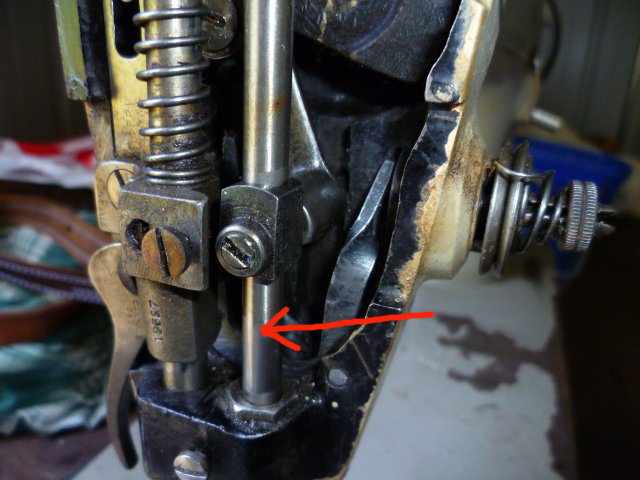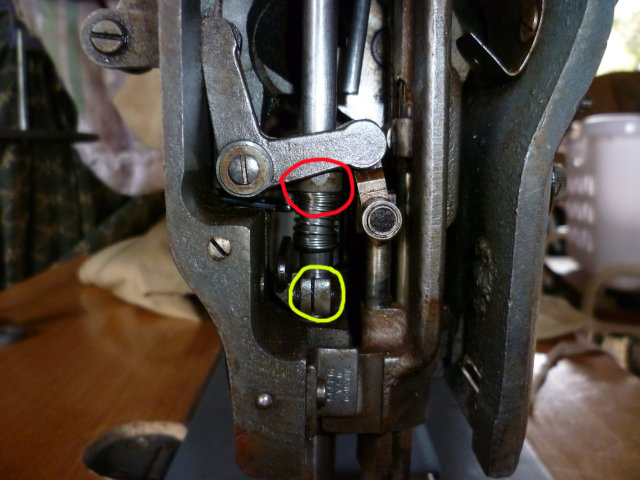-
Posts
4,828 -
Joined
-
Last visited
Content Type
Profiles
Forums
Events
Blogs
Gallery
Store
Everything posted by dikman
-
(I couldn't find a rolling-on-floor-laughing thingy).
-
Thanks Mike, most interesting. I recall learning something about this process a long time ago, but I'd forgotten most of it (didn't have any practical use for it). I know that some custom motorcycle artists still use gold leaf. The clear coat applied first when building up the transfer makes sense and perhaps explains why no clear coat is applied afterwards (which would simplify the manufacturing process). Parfektionisto, good luck with trying to replicate the original. Based on what Mike has said, with it being built up of multiple layers, it would be a very labour-intensive process and, I suspect, require quite a bit of skill to get it right - which could = $$$$.
-

Does a sheath need a safety lining?
dikman replied to Willie0's topic in Gun Holsters, Rifle Slings and Knife Sheathes
Irfanview. It's free and lets you size them to whatever you want. -

Does a sheath need a safety lining?
dikman replied to Willie0's topic in Gun Holsters, Rifle Slings and Knife Sheathes
Looks good, Willie. That's really about all you can do with a dagger, sewing both edges gives it a balanced look. Kydex, plastic etc liners may protect the leather, but are not that good for the knife's edge! -
Thanks Mike. My experience with waterslide decals (modelling) has been that you have to treat them very carefully once they are slid off the backing as they tend to be somewhat fragile. Which is why I thought they were using a dry rub system, judging by the effort she was applying in burnishing them down! I wonder if we'll ever know exactly what they used?
-
I hadn't intended watching all of that film - but I did! Absolutely fascinating, a time when quality control meant something. The noise must have been horrendous, particularly in the "rumbling" area, all those steel drums filled with castings and ball bearings and rotating!!!! It appears that they used a transfer system for the lettering, not a slide decal as we know them. The woman pressed them onto the machine, rubbed them down, peeled off the backing and then appeared to rub them very hard. Were they adhesive. or is it like the dry transfer system used with gold leaf? I couldn't tell, also I didn't see them put on a clear coat? I loved the little loco and wagons in the yard with Singer painted on them.
-
Looks like quite a complex little machine, and that thread stand behind it looks interesting....
-
May not necessarily be true - way back in the old days companies often had their own painting and signwriting sections. Uwe, now that you mention it I notice that the gap between the two S's appears to be slightly wider than the rest.
-
Don't know about these decals, Constabulary, but I do know that the decals used in plastic model kits can deteriorate with age and fall apart when applied! (And I suspect yours may be much older than model kits!).
-

Needles 16x63 series specifically 16x113 what are they?
dikman replied to JessH's topic in Leather Sewing Machines
This is the needlebar on a 31K20 that I had, it should be similar on your machine. It's the "bar" (actually a rod) that the needle attaches to. To adjust, loosen the clamping screw and slide up and down, setting the scarfe on the needle to the correct position relative to the bobbin hook. 135/16 and 17 are commonly used on quite a lot of older machines, so adjusting for them would make buying needles much easier. -

Needles 16x63 series specifically 16x113 what are they?
dikman replied to JessH's topic in Leather Sewing Machines
Presumably you have a clutch motor fitted. It can take quite a bit to learn to master one for the slow speed needed for leatherwork. Best thing is to fit a servo motor, this will give excellent slow speed control and make it much easier to use the machine. -

What machine should a beginner buy?
dikman replied to purplecinnamon's topic in Leather Sewing Machines
If you haven't read this yet, it's probably the definitive answer to your question- You could probably pick up a suitable used machine at a good price if you look around, but as Floyd mentioned be wary. Often used machines will need work and/or parts. The Singer 111/211 class, Seiko, Consew, Pfaff are fairly typical of the older models that are around (regardless of country, it seems). There are, of course, more than I have mentioned. You definitely need a walking foot and ideally a servo motor, which will make it much easier to learn to use. Best thing is to try and come up with a list of machines that would be suitable (spending time reading posts here should help) and then start looking. If you find one try and get photos and post on here asking for advice. Oh, and ignore any ads that say "industrial quality, semi-industrial etc" - such machines are invariably domestic machines. It's a big step up to an industrial sewing machine, so don't be discouraged. -

Needles 16x63 series specifically 16x113 what are they?
dikman replied to JessH's topic in Leather Sewing Machines
I have a 331k4, not sure how different it is to a k5, but I use 16x2 needles, which are easy to get. Can't remember if I had to tweak the needle bar and timing because I had to do a bit of work on it to get it working in the first place! -
Just as well you asked first, or you would have been very disappointed if you'd bought it. The little motor on the back is a dead giveaway, it's a domestic. I notice that the seller doesn't actually mention the model number anywhere. Many will advertise them as "industrial quality", "semi-industrial" or "light industrial", all of which are meaningless terms when it comes to sewing machines. As Mike said, they are either domestic or industrial. Full stop. Wiz, we used to refer to that smell as a "dark brown smell", it always seemed apt when something electrical cooked itself.
-

Pfaff 145 h4 and New Tech servo motor
dikman replied to seamsperfect's topic in Leather Sewing Machines
Well done, sounds like a good buy. The motor "manual" - don't bother searching as I doubt you'll find one, most of these "manuals" seem to be just a few pages of "Chinglish" that usually takes a bit of deciphering. If it's working it will pay to leave the settings alone for now. I use a head magnifier whenever I'm working on a machine (old eyes and it's much better than my glasses!). IF you decide to dismantle anything with small screws be very careful about NOT losing the screws. The fact that you've got it sewing straight off is very good, as Uwe said use it and become familiar with it before trying to make any changes. -
Well done. The interaction of the bits can be a bit daunting at first, but once you've worked it out it's a great feeling of achievement!
-
Definitely not right! As I don't have a 155 I'm reluctant to tell you what to adjust, but besides the external adjusting link the lifting can be affected by some internal adjustments (on the shaft inside the end cover). The outer foot also looks to me like it doesn't have enough lift.I found with my Singers that it took a lot of reading of instructions and adjusting of stuff until I could figure out how to get the feet set to the optimum. The two circled adjustments will affect the height of the feet and the relative movement of them (yours might be slightly different to this). There is a limited amount of adjustment to get the right spot. I'm not saying this is the answer but it's something to keep in mind, seeing that you don't know just who has adjusted what on this machine. I'm wondering if whoever worked on it knew what they were doing?
-

COWBOY CB4500/441 NARROW FEED DOG + NEEDLE/THROAT PLATE???
dikman replied to RockyAussie's topic in Leather Sewing Machines
Just a wee bit hard, then! I reckon you could get away with opening it enough just for the head of the screw to fit flush, and not worry about the rebate for the head to rest on as there should be enough in the rest of the slot for that. -

Pfaff 145 h4 and New Tech servo motor
dikman replied to seamsperfect's topic in Leather Sewing Machines
As Uwe said, that servo is probably pretty generic judging by the control box. If it's working and runs for a few minutes then it should be ok. Ideally you would want to get the "handbook/manual" with it so that you know how to adjust the settings if needed. As for power etc. it should be more than adequate for your needs. A quick search doesn't bring up that name, which isn't surprising as if it's an older one that brand name probably doesn't exist anymore. -

COWBOY CB4500/441 NARROW FEED DOG + NEEDLE/THROAT PLATE???
dikman replied to RockyAussie's topic in Leather Sewing Machines
I think you'll need to use abrasive (stone) bits to open up that hole. Even carbide can have issues if the steel is good stuff that has been hardened properly - which this obviously is. -

COWBOY CB4500/441 NARROW FEED DOG + NEEDLE/THROAT PLATE???
dikman replied to RockyAussie's topic in Leather Sewing Machines
You must be feeling pretty pleased with yourself . It wouldn't take much to open out that screw hole with a Dremel and a grinding bit. -
The decal-setting solutions are used by plastic modellers, if you have any hobby shops nearby that sell plastic model kits they may be able to help. As for cutting a stencil and spraying the name, that would be a lot of work and may not look as neat, particularly on a rough surface.
-
Looks a lot better than when you got it, Jeff. Nice job.
-

TOMAHAWK SHEATH
dikman replied to Dave Richardson's topic in Gun Holsters, Rifle Slings and Knife Sheathes
Ok, thanks Dwight. I still wouldn't mind trying to make one sometime, could be an interesting project. -

TOMAHAWK SHEATH
dikman replied to Dave Richardson's topic in Gun Holsters, Rifle Slings and Knife Sheathes
Do the different tribes have their own pattern? I always thought that the Indians used whatever they could get hold of. Looks like I'm about to learn something new.....




